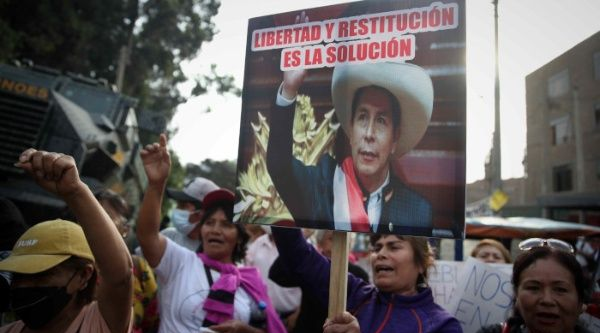
Photo: EFE
By María Josefina Arce.
Four months have passed since the ousting of democratically elected President Pedro Castillo, and the political and social crisis continues to dominate the Peruvian nation, the scene of heavily repressed protests since December 7.
Dina Boluarte, sworn in as president by the Congress to complete the current period of government until 2026 and until then vice-president, is unable to ensure stability in Peruvian territory and the death of some 60 demonstrators weighs on her responsibility and that of her executive.
The current president appeared last March before the Attorney General of the nation, Patricia Benavides, in the framework of the investigation for genocide, homicide, and serious injuries against the participants in the protests. The truth is that so far not a single intellectual and material responsible for these deaths have been brought to trial.
The president of the National Assembly of Governors, Rohel Sanchez, representatives of the Catholic Church, and relatives of the victims demand that these crimes not go unpunished.
In addition, there have been hundreds of arbitrary arrests, the intervention of premises of peasant organizations and political parties, and even a military occupation of the Universidad Mayor de San Marcos, in Lima, the capital city.
During all this time, the demonstrators have seen their demands ignored: the release of Castillo, who is serving 36 months in preventive prison for alleged corruption crimes, denied by the former president who claims to be "unjustly kidnapped".
The majority of Peruvians fundamentally demand the resignation of Boluarte, the calling of new elections, and a referendum for a constituent assembly in the shortest possible time.
But Boluarte refuses to leave the position to which she acceded after Castillo's dismissal and arrest, at the same time that an agreement in Congress to bring forward the elections and open the way to put an end to the current crisis shaking the country is not prospering.
The fragmented legislative body, but with the power to promote vacancy votes for alleged moral incapacity, is nevertheless rejected by nine out of ten Peruvians.
According to a survey published at the end of last month by the Institute of Peruvian Studies, 78% of citizens disapprove of Boluarte's government and 91% disapprove of Congress.
Peru, which has been immersed for four months in a deep crisis with a high social and human cost, has been living in political and social instability since 2016. In six years, six presidents have succeeded each other, who have not been able to move the country forward, where there is a strong confrontation between the executive and legislative powers.

